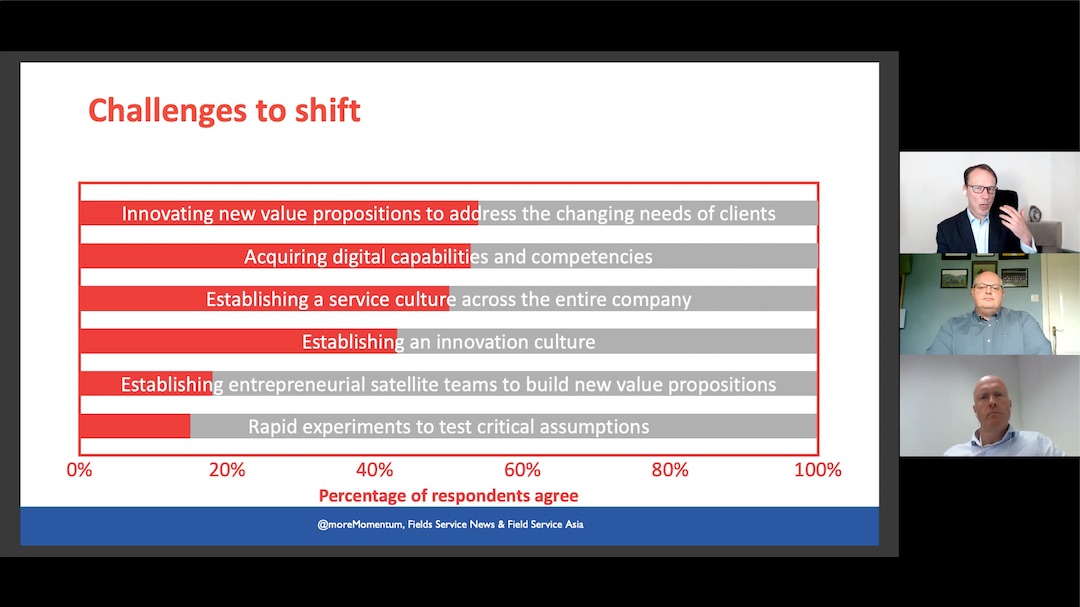Tailoring the Right Innovation Methodology for Each Phase in B2B Services
Navigating innovation in B2B manufacturing is essential for transforming services into strategic business lines. Adopting tailored methodologies for...
5 min read
Jan van Veen
Feb 14, 2024 12:42:43 PM

In the evolving service industry, rapidly adopting advanced services is crucial. Service providers must strategically address adoption barriers and enhance customer value through education, support, and communication, ensuring a smooth transition and mutual growth in this dynamic landscape.
In today's rapidly evolving business landscape, service transformation is a pivotal strategy for organisations aiming to stay competitive and relevant. This transformation, characterised by integrating digital technologies in operations and asset management, is not just a trend but a necessary shift to harness efficiency, innovation, and enhanced customer experiences. However, the journey towards fully embracing these advanced services is fraught with challenges for service providers and their customers.
Service providers are tasked with developing and implementing cutting-edge solutions and convincing their customers of the value and indispensability of these innovations.
On the other hand, customers, often wary of the unknown, may resist adopting these new services due to various concerns. Although customers often raise data security and ownership issues, this probably is not the root cause.
Their concerns range from apprehensions about the complexity and reliability of new technologies to fears about the disruption of established processes and the potential risks involved. This resistance frequently manifests in a lack of interest or direct objections, posing a significant hurdle for service providers to drive service transformation forward.
Understanding and addressing these challenges is crucial for accelerating the adoption of advanced services, a theme that will be explored in depth at the upcoming Executive Service Roundtable in May. This event promises to be a valuable opportunity for service leaders to gain insights and strategies to overcome customer pushback and pave the way for a successful service transformation journey.
As service providers endeavour to steer their customers towards adopting advanced services, they encounter many obstacles that can hinder this transition.
One of the barriers is the perceived risk associated with new technologies. Customers often express concerns about the reliability, security, and potential disruption these innovations might introduce to their established systems and processes.
The impact on existing processes cannot be understated. Integrating advanced services often requires significant changes in how daily operations are conducted. This can lead to resistance from employees accustomed to existing ways of working and may lack the competencies required to navigate new systems effectively. The challenge is further intensified by the need for comprehensive change management strategies to guide these transitions smoothly, ensuring all stakeholders are aligned and adequately supported.
Moreover, adopting advanced services frequently demands developing new capabilities within the customer's organisation. This might include investing in new hardware, software, or training programs to ensure that employees are equipped to leverage these new services fully. Such requirements can lead to concerns about the additional costs and resources needed, potentially overshadowing the perceived value of the advanced services.
The complexity of new technologies also plays a significant role in hindering adoption. Customers may find it challenging to understand and integrate sophisticated solutions into their existing infrastructure, leading to apprehension and reluctance to commit to such changes.
These barriers collectively influence the customer's perception of value and cost considerations, often prioritising maintaining the status quo over embracing innovation. For service providers, understanding these obstacles is the first step towards developing effective strategies to address them, ensuring that the benefits of advanced services are communicated clearly and convincingly, and aligning them with the customer's organisational priorities and capabilities.
Accelerating the adoption of advanced services is not merely a strategic move for service providers; it's a critical lever for customers aiming to secure a competitive edge in an increasingly digital marketplace.
From the customer's perspective, swift adoption of these services can significantly enhance operational efficiency, cost savings, and the overall value proposition of their offerings. By leveraging cutting-edge technologies and service models, customers can differentiate themselves from competitors, offering their end-users more innovative, responsive, and personalised solutions.
For customers, the rapid integration of advanced services can also unlock new revenue streams and business models that were previously inaccessible. This agility in adopting new technologies enables them to respond more effectively to market changes and customer needs, fostering a culture of innovation that can drive long-term success and sustainability.
On the flip side, service providers stand to gain immensely from facilitating quicker adoption rates among their customer base. Increased adoption translates to higher immediate revenue from new service offerings and strengthens customer loyalty. Satisfied customers who see tangible benefits from advanced services are more likely to stick with a provider that demonstrates a clear commitment to their success and continuous improvement.
Moreover, service providers who successfully encourage rapid adoption of their advanced services can establish themselves as leaders in their industry. This market leadership is not just a badge of honour; it positions the provider as a go-to source for innovative solutions, attracting more customers and setting the stage for further growth and development. In a market with relentless technological advancements, being perceived as a front-runner in service innovation can significantly expand a provider's addressable market, offering more opportunities to differentiate and capture value.
In essence, the speed at which customers adopt advanced services directly impacts the service provider's ability to develop and refine state-of-the-art solutions, thereby influencing their capacity to stand out in a crowded market and expand their reach.
Read more about Service Innovation in our
Ultimate Guide for Service Innovation
To facilitate the adoption of advanced services among their customers, service providers must employ a multifaceted approach that addresses the core concerns and barriers their customer base faces. First and foremost, ensuring that the advanced service effectively solves a significant customer problem is paramount. This alignment between the service offering and the customer's needs sets the foundation for a successful adoption process.
Educational programs play a crucial role in this strategy. By offering comprehensive training and resources, service providers can demystify new technologies for their customers, making the benefits and functionalities of advanced services more accessible and understandable. These programs can range from online tutorials and webinars to hands-on workshops designed to enhance the customer's competencies and confidence in utilising new services.
Tailored support is another critical element. Recognising that each customer's journey and challenges are unique, personalised support mechanisms can help address specific concerns and technical issues that arise during the adoption process. This could include dedicated account managers, technical support teams, and customer success specialists who work closely with customers to ensure a smooth transition and effective utilisation of the services.
Risk mitigation practices are also essential. Service providers can offer pilot programs, phased rollouts, and robust service level agreements (SLAs) to alleviate concerns about potential disruptions and uncertainties. These practices provide a safety net for customers, allowing them to experience the benefits of new services with minimal risk.
Simplifying the integration of new technologies into existing systems is another critical strategy. By offering solutions that are compatible with or can seamlessly integrate into the customer's current infrastructure, service providers can significantly reduce the perceived complexity and disruption associated with adopting new services.
Clear communication, customer engagement, and feedback loops are the threads that tie these strategies together. Maintaining open lines of communication ensures that customers feel heard and supported throughout their adoption journey. Regularly soliciting and acting on customer feedback improves the service offerings and strengthens the relationship between the provider and the customer, fostering a partnership built on trust and mutual growth.
In conclusion, accelerating the adoption of advanced services is crucial for customers and service providers, offering competitive advantages, enhanced value, and growth opportunities. Overcoming obstacles to adoption requires a comprehensive approach, including educational initiatives, personalised support, and streamlined integration processes.
The upcoming Executive Service Roundtable in May presents an invaluable opportunity to delve deeper into these strategies and share insights. We also invite you to join us at the Service Transformation Summit in June, where we will further explore the advancement of service innovation capabilities. Together, we can navigate the complexities of service transformation and achieve sustained success.
Subscribe for the our Impulse Letter
With regular updates about service news, trends and best practices.

Navigating innovation in B2B manufacturing is essential for transforming services into strategic business lines. Adopting tailored methodologies for...

During the Field Service Asia Virtual Event of WBR, we discussed the findings of our research Innovate your way out of the Covid-Crisis. Which is...

Agile Service Product Management is vital to thriving in the digital age. It encompasses the critical role of service product managers in driving...